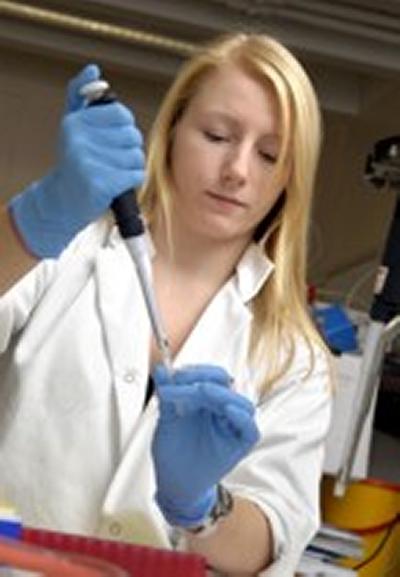Annie Cardew PhD: 'Specificity of Triple Helix Formation'

Annie Cardew always knew she would choose something scientific for her career. “Science is based on facts and observations, not just opinions” she said. “At school, I enjoyed all the sciences but found myself drawn to biology, through an interest in conservation.”
My friends doing dissertations in arts subjects are envious that I’m breaking new ground with my research.
“I just loved those David Attenborough programmes on TV when I was growing up. They were fascinating and inspired me to find out more about the natural world. I always knew I’d end up working in science, it was then just a matter of deciding which part.”
Breaking new ground in research
Now the 22-year-old is busy studying for a PhD after taking her first degree in Biochemistry, in Biological Sciences at the University of Southampton. She relishes the opportunity to work on something entirely new. “I have friends doing dissertations in arts subjects and they’re envious that I’m breaking new ground with my research.”
Southampton was an obvious choice for university after ‘A’ levels in Maths, Biology and Chemistry at school in Salisbury. “I spent a lot of time looking at the various prospectuses and course booklets from several universities to compare what was available. Southampton offered me exactly what I was looking for.
‘You start off with excellent core modules to introduce you to the various disciplines. The programme is very flexible with many different courses to choose from. I began doing Biology, then changed to Biochemistry after the first year because I found I preferred working in the laboratory and looking at life at cellular and molecular level. The department allows you to follow your interests through a huge range of options and you can even study a language. We also had a two-week field study trip to Spain, which was terrific because we could examine plants growing in a completely different climate.”
University is not all about studying. Annie enjoyed life on campus, making new friends from a wide range of backgrounds. “‘Southampton is a great city with so much for young people to do. Of course, I was very impressed with the university as well when I went along for the Open Day. Everyone was so friendly and I found it a very welcoming place. I’ve no regrets about going to Southampton at all.”
The young scientist found her undergraduate third year dissertation on DNA so rewarding she decided to study the topic in greater depth for a PhD. This higher-level research, largely based in the laboratory, involves investigating the structure of triplex DNA. Eventually, the results of this early-stage research could help with the development of new cancer therapies. Annie is well on track to complete her PhD in 2010.
“It’s amazing to think I’m examining something that no-one has investigated before. I get a lot of autonomy in my work in the laboratory but my supervisor Professor Keith Fox is on hand to advise if I have any questions.”
“The Biochemistry degree provided Annie with an excellent scientific background, which she could have used to access a wide range of careers”, says Professor Fox. “The undergraduate training provided an excellent knowledge base, while the research project that she did in her third year developed her analytical and experimental skills.
“I was delighted that Annie chose to develop her scientific skills by doing a PhD in my laboratory, as this will open up further career opportunities for her.”
Passing on a passion for science
The post-graduate student is now passing on her passion for science to the next generation, hoping to enthuse school pupils visiting the University on taster days. She’s explained about biological sciences to groups of up to 40 children, outlining what’s involved and encouraging them to consider going on to higher education. “It’s important that today’s young people get the right idea about science. I want to get the message across that you don’t have to be a geek to be a scientist.”
Outreach is an important activity in Biological Sciences, as academics pass on their enthusiasm in an effort to inspire future students and researchers. Annie also tutors teenagers in GCSE science subjects. “It’s great when you see a young person grasp a concept for the first time, when they understand it and realise why it’s important.”
Looking to the future, Annie would like to work in forensic science. “I like the idea of using scientific skills to investigate difficult problems. I’m not sure whether I’d like to work for the police or maybe an organisation such as an environmental health office but I’ve got plenty of time to decide.
Whatever happens, she will be sorry to leave Southampton’s laboratories. “I’m really enjoying my studies here and I shall miss it when it’s over,” she says.